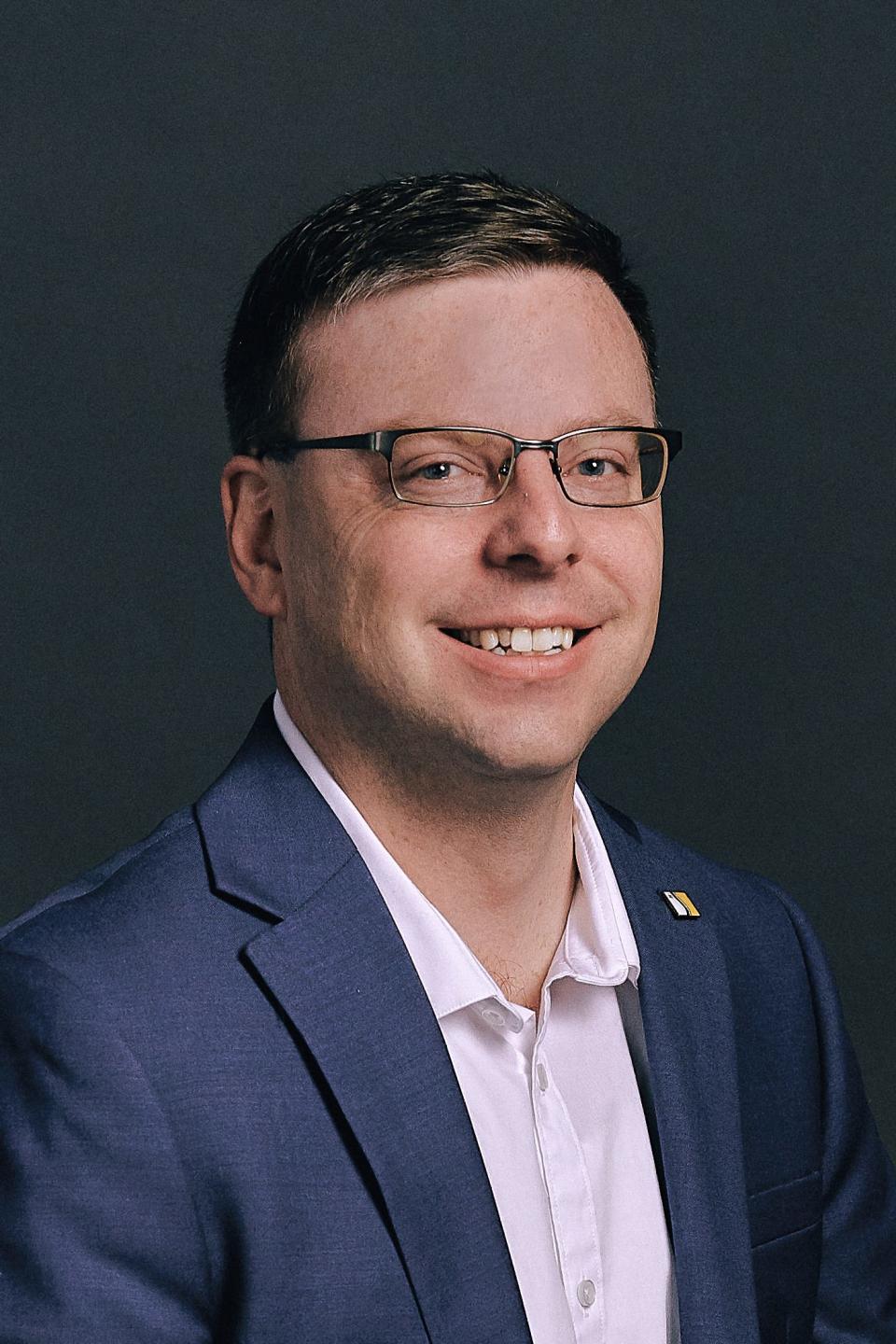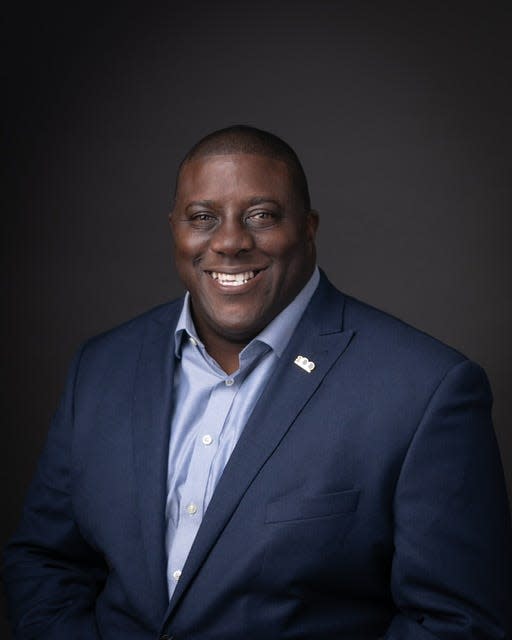South Bend mayor candidates Mueller, Upchurch share their views on issues facing city
The Tribune is partnering with the League of Women Voters of the South Bend Area and the American Democracy Project of Indiana University South Bend to publish candidates' answers to questions on the issues. The League, with local help from the ADP, operates Vote411.org, a website with information about the candidates and their positions on key issues.
The Tribune has agreed to run candidate answers unedited, meaning any spelling, typographical or grammatical errors are the candidates' own. The Tribune is publishing only some of the questions from a selection of contested races. Additional questions and answers, including from candidates who have no opponent in the primary, are available at Vote411.org.


South Bend Mayor James Mueller, a Democrat faces a challenge from Republican Desmont Upchurch.
James Mueller
Occupation: Mayor
Email: victoria@muellerformayor.com
Website: muellerformayor.com
Campaign phone: 574-334-9322
Facebook: facebook.com/SBJamesMueller
Twitter: @SBMayorMueller
Desmont Upchurch
Occupation: Statesman
Email: desmont.upchurch1@gmail.com
Website: desmontformayor.com
Campaign phone: 574-303-8787
Facebook: facebook.com/desmontformayor
Twitter: @desmontupchurch
What is the most important challenge facing South Bend and how will you address it as mayor?
Upchurch: The most important challenge facing our city would be violence and the way I would address this challenge is as follows: 1. Community Engagement: The first step is to engage the local community in identifying and prioritizing the most pressing issues. This can involve town hall meetings, surveys, and involving residents in decision-making processes. 2. Education and Workforce Development: Invest in education and workforce development programs to equip residents with the skills needed for employment opportunities within the city. 3. Community Programs: Create and support community programs that directly address the challenges. For example, if affordable housing is a concern, initiatives to incentivize affordable housing development can be implemented.
Mueller: Public safety has been my top focus since day one. We must win the battle for our kids’ hearts and souls to stop the gun violence that is tearing our community apart. I will continue to support and fully fund our critical public safety services, including street outreach with the those who are causing the most violence. We’ve added nearly 100 new officers, a third of whom are women and people of color, and SBPD is fully staffed for the first time in many years. I will also continue to advocate for common sense gun measures at the state and federal levels to keep firearms out of the wrong hands. Longer-term investments in our kids are also critical. We must build on the nearly 500 new pre-K seats created in partnership with our schools and the United Way.
If elected, what steps will you take to ensure economic growth and development is widely distributed across the entire community? Are there specific industries or areas of the city you would focus on for more investment, and why those?
Upchurch: Ensuring that economic growth and development benefit all segments of a community requires intentional and inclusive strategies. Here are ways to promote economic growth and development: 1. Small Business Support: Foster entrepreneurship by providing training, mentorship, and access to capital for aspiring entrepreneurs in all communities. Create business incubators and accelerators that focus on small enterprises. 2. Workforce Development: Invest in education and workforce training programs to equip residents with the skills needed for local job opportunities. Collaborate with local businesses to design training programs that match their workforce needs. Creating a distribution of economic growth and development requires a sustained commitment from government, businesses, community organizations, and residents.
Mueller: With record investment in our city and more than a billion dollars of new projects, we want to make sure this progress is felt across the entire city. On almost everything we do, we depend on partnerships to deliver services or invest in developing new housing, commercial space or jobs. These partnerships are critical, and investors are looking at where the market makes sense and where the workers are. The most critical investments we can be making are not necessarily in businesses themselves but in our workers, housing stock and quality of life. With businesses looking for workers, we must invest in our people and build on their skills, while we also continue to attract new residents to South Bend.
Several recent local examples show the importance of communication among elected officials. Issues surrounding a civilian board to review police behavior and attempts to fund a mental health crisis center illustrate this point. How will you ensure effective communication with other elected officials, as well as transparency with the public?
Upchurch: Civil discourse would be the key to working with whomever our city selects to represent them. Our privilege as elected officials would be to find common ground in order to effectively move our city forward. South Bend is facing many challenges - some we can agree on and others we won’t, however making sure we communicate what the citizens are asking for would be our duty. I would also make sure the staff is heard, as well as the citizens. No voice is too big and no voice is too small.
Mueller: Communication is important to every successful relationship. Understanding other points of view, working to find common ground and being willing to compromise whenever possible are also critical. That’s my approach. To be successful, we have to work together. That’s the way our government was designed. That’s exactly what the Common Council and I have done and how we’ve been able to deliver progress across the city, including in neighborhoods that have been forgotten in the past. It’s not always easy. The South Bend team is incredibly diverse in every sense and brings many different perspectives. Yet, we continue to find common ground and keep the city moving forward together.
What is the best way to curb crime? Should we increase police staffing, technology and budgets? Or should we redirect resources away from policing? Please explain your reasoning.
Upchurch: Curtailing crime in the city requires a multi-faceted approach that addresses root causes and involves various stakeholders. Here are some effective ways to curb crime: 1.Mentorship and Positive Role Models: Establish mentorship programs that connect young individuals with positive adult role models who can guide them and provide support. 2. Youth Outreach and After-School Programs: Invest in after-school programs and recreational activities that keep young people engaged in constructive activities during non-school hours. Provide opportunities for skill-building, leadership development 3. Economic Opportunities: Address economic disparities by creating job training programs promoting entrepreneurship, and attracting businesses to underserved neighborhoods Support initiatives that provide job placement assistance and local hiring.
Mueller: We’ve been presented with a false choice: invest in our people or provide necessary resources for public safety services. During my administration, we’ve done both. We’ve made record investments into social infrastructure, into our people, and into our kids. At the same time, we’ve also been bold with resources for our officers. We’ve raised pay and brought in nearly 100 officers, a third of whom are women and people of color. Where other cities are seeing shortages, we’re fully staffed. We’ve also embraced 21st century policing with cutting-edge technology and policies to ensure that we are fair, impartial and getting the job done in the best way possible. We’ve invested in both our officers and our community.
What can the city do to address the issues of children and adults living in poverty and/or homelessness in the community?
Upchurch: Addressing the issues of children and adults living in poverty is crucial for South Bend. 1. Childcare Assistance: Offer subsidies and support for affordable and high-quality childcare services, allowing parents to work or pursue education. 2. Living Wage and Benefits: Advocate for a living wage that allows adults to support themselves and their families without relying on public assistance. Promote benefits like paid family leave, sick leave, and affordable healthcare to reduce financial instability. Combining these efforts with effective policies and social safety nets can make a significant impact in improving the lives of children and adults living in poverty.
Mueller: We work to extend opportunity to all and have adopted housing first as a principle. Housing first means not having preconditions on our unhoused neighbors before providing shelter. This evidence-based approach provides the help needed in a more stable environment and has been shown to be more successful in addressing chronic homelessness. We’ve secured over 100 permanent supportive housing units, which come with support and services, and we’re working with partners to build more in the coming years. We’re also working with partners to build a low-barrier intake center. Right now there’s Motels4Now. Even though our County partners decided to abandon that program, South Bend stepped up to continue it until the permanent, new low-barrier center is completed.
This article originally appeared on South Bend Tribune: South Bend mayor hopefuls Mueller, Upchurch speak on issues city faces

